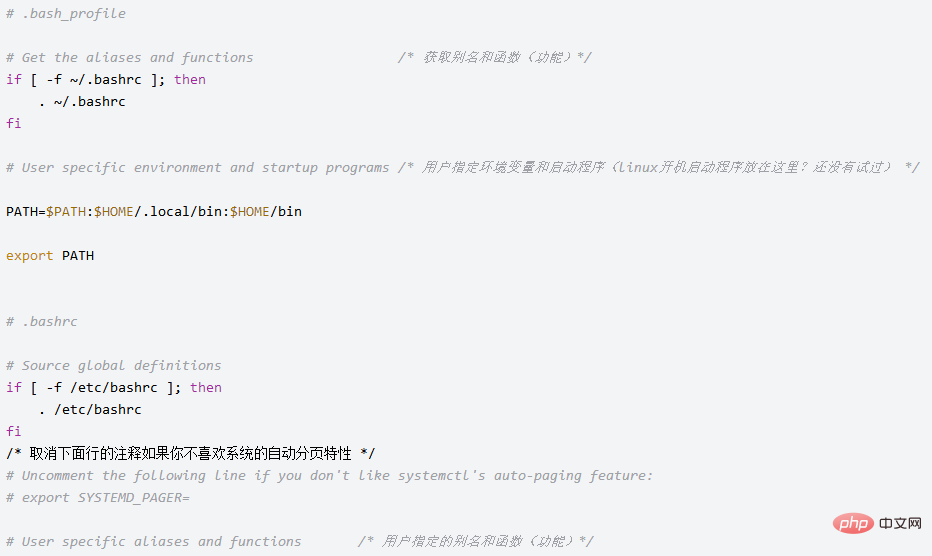linux环境变量有两个位置:1、“/etc”目录下的bashrc、profile和environment文件,文件内是已经配置好的环境变量;2、用户目录下的“.bashrc”和“.bash_profile”文件,这两个文件是都是隐藏文件。

本教程操作环境:linux7.3系统、Dell G3电脑。
linux的环境变量在哪里
1、系统位置,/etc目录下的bashrc、profile、environment三个文件
2、用户目录(root或普通用户)下的.bashrc、.bash_profile两个文件,注意这两个文件前面都有点,是隐藏文件。
先说这3个系统文件,列出文件内容(参考CentOS7)。 /**/为添加注释
# /etc/bashrc # System wide functions and aliases /* 系统广泛功能(函数)和别名 */ # Environment stuff goes in /etc/profile /* 环境东西(环境变量)在/etc/profile文件中 */ /* 修改这个文件不是一个好主意,除非你知道自己在干什么。*/ /* 在/etc/profile.d/目录下创建一个自定义脚本会是修改环境变量的更好方法 */ /* 但是会阻止在将来更新时合并的需要 */ # It's NOT a good idea to change this file unless you know what you # are doing. It's much better to create a custom.sh shell script in # /etc/profile.d/ to make custom changes to your environment, as this # will prevent the need for merging(合并) in future updates. …………………………………………………………………… …………………………………………………………………… …………………………………………………………………… # /etc/profile # System wide environment and startup programs, for login setup # Functions and aliases go in /etc/bashrc # It's NOT a good idea to change this file unless you know what you # are doing. It's much better to create a custom.sh shell script in # /etc/profile.d/ to make custom changes to your environment, as this # will prevent the need for merging in future updates. …………………………………………………………………… …………………………………………………………………… ……………………………………………………………………
第三个文件environment文件打开是一个空文件,不表。
再说两个用户文件,贴上文件内容(参考CentOS7)/**/为添加注释
普通用户:

root用户
# .bashrc # User specific aliases and functions /* 用户指定的别名和函数(功能)*/ alias rm='rm -i' alias cp='cp -i' alias mv='mv -i' # Source global definitions if [ -f /etc/bashrc ]; then . /etc/bashrc fi # .bash_profile # Get the aliases and functions /* 获取别名和函数(功能)*/ if [ -f ~/.bashrc ]; then . ~/.bashrc fi # User specific environment and startup programs /* 用户指定环境变量和启动程序(linux开机启动程序放在这里?还没有试过) */ PATH=$PATH:$HOME/bin export PATH
这几个文件的注释已经说得很清楚了,bashrc文件是 用户指定别名和函数(功能), bash_profile文件是用来获取bashrc文件中的别名和函数(功能),用户还可以在此文件中指定环境变量和开机启动程序。在系统的bashrc、和bash_profile文件明确说明 在/etc/profile.d/目录下创建一个自定义脚本会是修改环境变量的更好方法。如图:

到这里文章就结束了,但是在实际配置环境变量中发现,如果变量仅配置在系统配置文件中,以普通用户登录系统终端中是有自己添加的环境变量,一旦su到root,终端中就没有了之前配环境变量。解决方法就是在每个用户的配置文件中都配置一次,这样太麻烦。在/etc/profile.d/目录下创建一个自定义脚本的方法无论你在一个终端中如何切换用户,环境变量依然存在。
相关推荐:《Linux视频教程》
以上就是linux的环境变量在哪里的详细内容,更多请关注自由互联其它相关文章!
